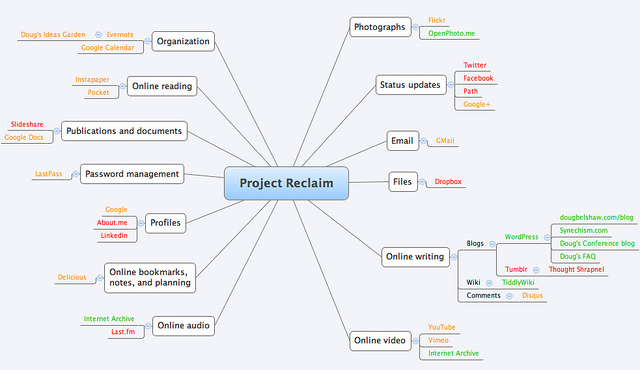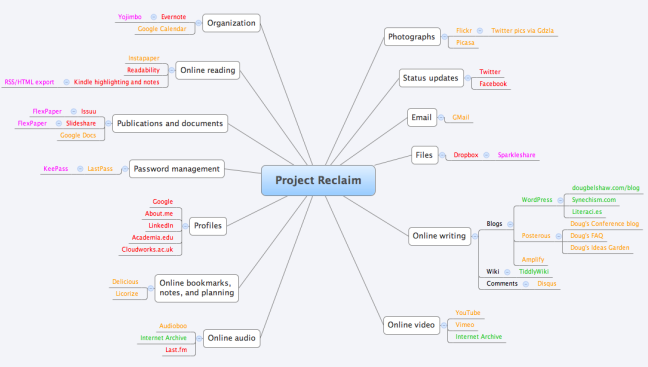Project Reclaim: a pragmatic update
Boone Gorges, who originally started me on the path towards reclaiming my own data, has posted an update on his Project Reclaim. I thought it was about time I did the same.
I’d already mapped out the various tools I use (see updated version above), consolidated my blogs and experimented with openphoto.me. Just over a week ago I moved web hosts from Bluehost to Hippie Hosting. The latter is a co-operatively owned web hosting service.
There are, however, at least FIVE services that I’m not planning to move away from at the moment.
The first, and probably most obvious of these, is Twitter. At the moment it’s pretty much impossible to export my tweets in a meaningful way from the service. But a social network is nothing without community, so I’ll be there until something better comes along. (I don’t, however, use Facebook apart from a place to link to my newsletter or blog posts)
Next we have Dropbox. I really do love this service as it means I’ve got all of my stuff everywhere I am. We’ve also started using it within the Learning team at the Mozilla Foundation. I could try ownCloud or similar but when it comes to having my documents and sharing them easily with others, I want as little friction as possible.
Third is mobile-only social network called Path. All of my family now use this to post photos, videos and updates. It keeps us all in touch. Whilst it would be really nice to be able to get my data out of here quickly and easily the beautiful interface and benefits outweigh anything else at the moment.
Fourth we have Google’s services. With the proviso of switching off my search history and encrypting my searches, I’m fairly happy to use GMail, Google Drive and Google Calendar at the moment. Actually, that’s a bit disingenuous – they’re central to my workflow. I also use Google+ occasionally. Whilst I’m slightly uneasy with the situation, at least I can export my data quickly and easily using Google Takeout.
And finally comes Slideshare. I’ve experimented with using HTML5 slides but (a) they take while to put together, (b) I recently went over 100,000 views on Slideshare (one-hundred thousand!), and (c) I haven’t (currently) got the skills to make HTML5 slides as aesthetically pleasing as a a Keynote/Slideshare combo.
Conclusion
I’m going to continue with Project Reclaim as I think it gives me a steer in choosing the technology I use on a day-to-day basis. However, I’m going to be pragmatic about it. I could decide to use identi.ca instead of Twitter but, whilst that would give me a warm smug glowing feeling of openness, it would cut me off from contacts I find extremely useful and valuable.
You’ve got to balance these things out.
One thing that has been launched recently which is a huge boon to those looking to be more in control of their own data is ToS;DR. As TechCrunch pointed out, the biggest lie on the internet is that people read and agree to tortuously-long Terms of Service agreements. Instead, they’re more like “too long; didn’t read” (TL;DR). The Unhosted venture reviews Terms of Service agreements and rates them on various factors.
It’s definitely worth a look.



